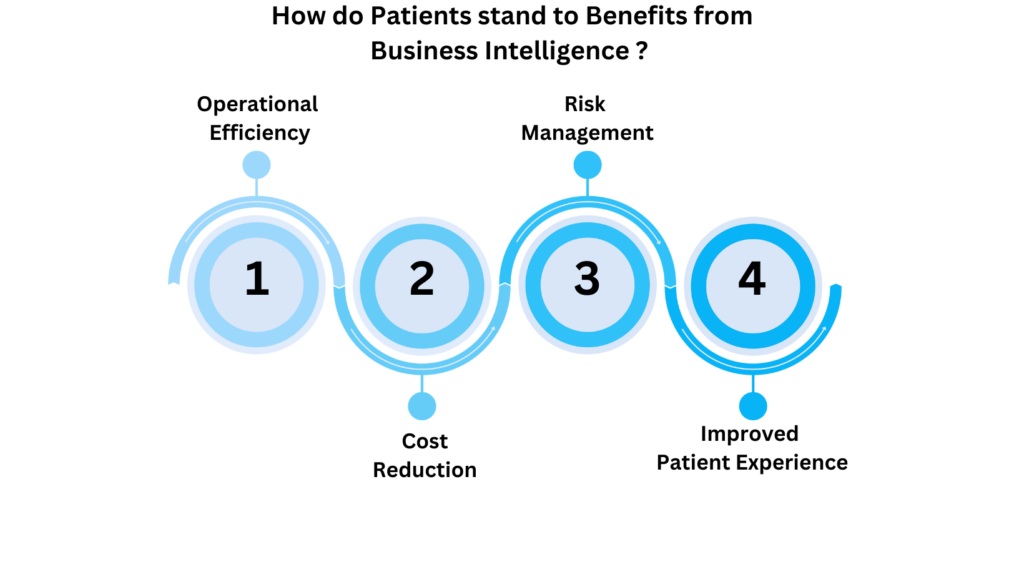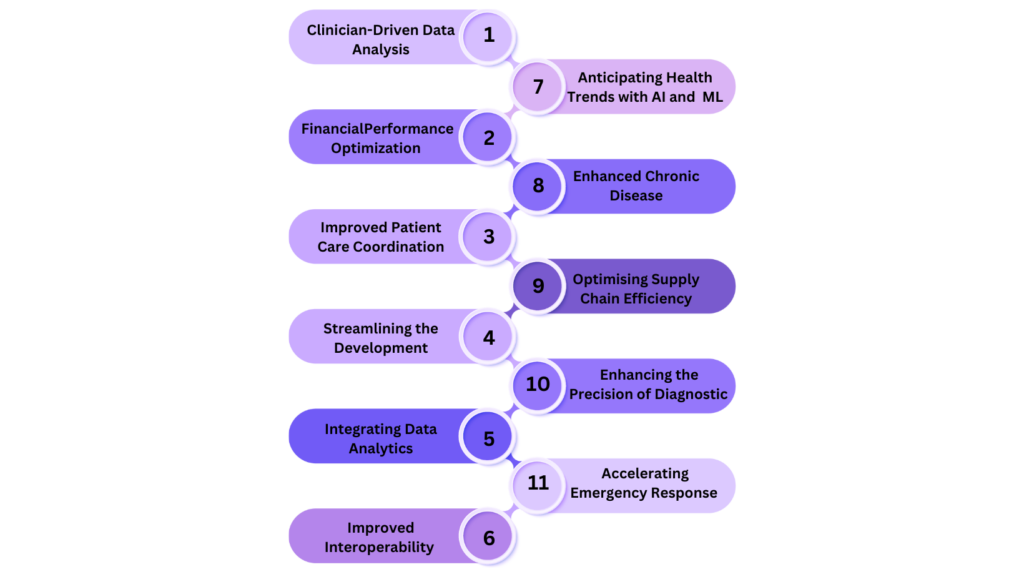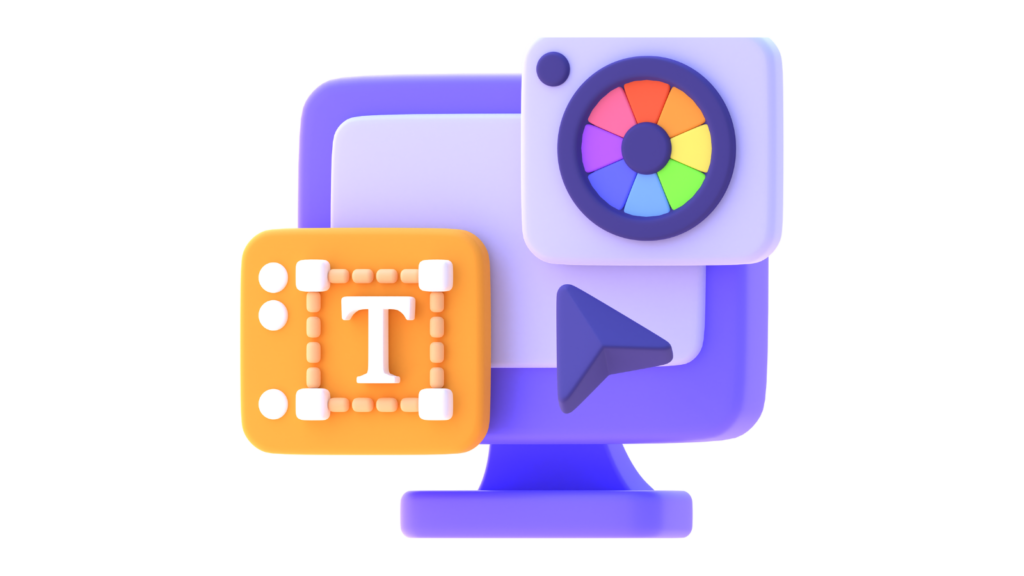The incorporation of business intelligence in healthcare is transforming patient care by empowering medical professionals to make informed decisions through intricate data analysis. This pioneering approach has elevated the standards of patient care, as business intelligence in healthcare converts complex data into practical insights, influencing treatment strategies, and optimising operational efficiency. Embracing these technologies signifies a transition towards a more data-driven approach in the management of patient health.
Benefits of Business Intelligence in Patient Care
The adoption of intelligent business intelligence systems in healthcare facilities enables better anticipation of needs and quicker responses. Every small improvement in efficiency has the potential to result in life-saving changes in patient care. Here are some key ways in which business intelligence significantly alters and improves patient care.

1. Operational Efficiency
In the healthcare sector, enhancing operational efficiency is crucial for advancing patient care. Medical business intelligence allows hospitals to streamline processes for optimal performance. This form of intelligence transforms intricate datasets into practical operational strategies, aiding in the optimization of various aspects, including patient admissions and discharge protocols.
Healthcare providers can reduce wait times and enhance the quality of care by leveraging data analytics. Improved data analytics also enables precise inventory management, minimizing wastage. Effective utilization of data ensures that resources are available when needed. These systematic enhancements contribute to a significant improvement in overall patient services.
Also Read – The Significance of Digital Transformation in Healthcare.
2. Cost Reduction
Precision and foresight are crucial in managing healthcare finances. The implementation of Healthcare Business Intelligence (BI) to enhance patient outcomes often results in substantial financial savings. It identifies opportunities for cost reduction without compromising the quality of patient care. Comprehensive analytics empower healthcare facilities to steer clear of unnecessary expenses. The integration of business analytics in healthcare enables hospitals to plug financial leaks by optimizing supply chain management and minimising administrative overheads. It also aids in standardising care protocols to avoid costly redundant procedures.
By leveraging predictive healthcare business analytics, the occurrence of costly emergency interventions can be minimized through early identification and intervention in health issues. The efficient utilization of medical resources not only decreases expenses but also enhances patient satisfaction. Over the long term, these cost reductions can support additional innovations, contributing to the establishment of a sustainable healthcare system. Each dollar saved through intelligent analytics can be reinvested in patient care, thereby enhancing the potential for recovery and improved health outcomes.
3. Risk Management
Effectively managing risk is crucial for delivering high-quality healthcare. The integration of business intelligence in healthcare provides providers with essential foresight, identifying patterns that may pose risks to patients. Successful risk management involves anticipating and preventing medical errors, as well as ensuring the security and privacy of patient data. Business analytics in healthcare transforms data into a defensive tool.
This minimizes complications and improves patient safety measures. Healthcare facilities become skilled at predicting and preventing potential hazards. The utilization of predictive analytics can also result in more informed staffing decisions, ensuring that patient care remains both safe and effective. This purposeful use of data is reshaping the way hospitals proactively address risks.
4. Improved Patient Experience
Ensuring a positive healthcare experience is essential for achieving patient satisfaction. The direct influence of business intelligence in hospitals on this aspect is significant. It offers valuable insights into patient preferences and behaviours, enabling healthcare services to be tailored to individual needs. This personalized approach enhances patient engagement and streamlines the efficiency of care delivery. The use of business intelligence systems in healthcare proves to be a substantial benefit, allowing facilities to adapt processes to reduce wait times and enhance communication. A heightened focus on patient experience is also associated with improved health outcomes.
The incorporation of tools for healthcare business intelligence is essential for attaining elevated standards in patient outcomes. This strategy not only improves the quality of care but also optimizes operations within the healthcare sector.
Also Read: A Comprehensive Guide to Healthcare Mobile App Development.
Use Cases of Business Intelligence in Patient Care
Highlighted below are the primary ways in which business intelligence can transform patient care, showcasing the influential role of data in improving healthcare outcomes.

1. Clinician-Driven Data Analysis for Enhanced Care
Clinicians equipped with healthcare business intelligence make decisions based on comprehensive information, enabling the personalization of treatment plans using patient data. This precision-oriented approach enhances the diagnosis and treatment of patients. Through the analysis of trends, clinicians can predict and prevent potential health issues.
Healthcare analytics and business intelligence also contribute to monitoring treatment outcomes. Real-time data facilitates prompt and effective adjustments to care plans. Clinicians have become more skilled in managing chronic conditions through the utilisation of this data. The focus is not merely on reacting but on proactively enhancing patient health.
2. Financial Performance Optimization for Care Services
Maintaining financial health is crucial for sustaining high-quality patient care. Healthcare business analytics identifies opportunities for cost reduction, ensuring that funds are allocated where they have the greatest impact on patient care. Efficient financial management also contributes to the provision of more affordable healthcare services.
3. Improved Patient Care Coordination Among Departments
Efficient and coordinated care is crucial for ensuring a smooth patient experience. Hospital business intelligence plays a crucial role in enhancing this coordination by offering a comprehensive overview of patient interactions across various departments. Shared analytics enable synchronised patient treatment plans, resulting in a reduction of redundant tests and more timely treatments. Breaking down silos in information facilitates a more cohesive and patient-focused approach to care.
4. Streamlining the Development of Pharmaceuticals
Incorporating business intelligence into healthcare significantly streamlines the processes of research and production in the pharmaceutical sector. This integration enhances the efficiency of data analysis in clinical trials, expediting drug development cycles. It enables the early identification of effective compounds, accelerating the path to market.
5. Integrating Data Analytics into Treatment Protocols
The integration of analytics into treatment protocols brings a personalised and improved dimension to patient care. Healthcare business intelligence enables in-depth analysis of patient data, resulting in highly individualised treatment plans. Providers, by grasping the application of healthcare business intelligence, can anticipate the most effective treatments for specific patient demographics. Real-time analytics assist in modifying treatments based on observed patient responses.
6. Improved Interoperability and Data Exchange
The effectiveness of treatment frequently relies on the smooth exchange of patient information. Healthcare business intelligence solutions play a crucial role in achieving interoperability among diverse healthcare systems, enabling secure and rapid data exchange crucial for comprehensive patient care. The improved sharing of data provides doctors with a comprehensive understanding of patients’ medical histories.
7. Anticipating Health Trends with AI and Machine Learning
AI in healthcare and machine learning take a leading role in healthcare analytics and business intelligence, not only predicting health trends but also revealing novel correlations. These technologies excel at analyzing intricate datasets to guide healthcare strategies, pinpointing trends that human analysis might miss.
8. Enhanced Chronic Disease Management with BI Tools
Business intelligence solutions in healthcare excel in the management of chronic diseases, facilitating personalized care plans derived from the analysis of patient data. These tools monitor health indicators continuously, allowing for adjustments to treatments as needed. The utilisation of IoT wearable devices for ongoing monitoring enhances the quality of life for patients with chronic diseases and aids in the early detection of potential issues, thereby preventing hospital readmissions. Insights from data play a crucial role in effectively managing patient adherence to treatment plans.
As an example, Digiatto IT Services has crafted a comprehensive healthcare platform named Health-e-People. This platform is meticulously designed for the seamless creation and management of records. With its user-friendly and multi-dimensional features, Health-e-People addresses the requirements of medical caregivers, patients, and researchers, establishing itself as the favored choice within the healthcare industry.
9. Optimising Supply Chain Efficiency in Healthcare Settings
Maintaining efficient supply chains is vital for the seamless delivery of healthcare services. Business intelligence in healthcare optimises procurement and inventory control, ensuring the availability of essential medical supplies without excess ordering. Advanced data analysis enhances the accuracy of predicting supply needs and minimises the risk of inventory expiration through just-in-time ordering. Data-driven supply chain management results in significant cost savings.
These savings can be redirected to enhance patient care services. Regular analysis of supply usage patterns refines ordering schedules, and predictive analytics aids in anticipating supply needs during epidemic outbreaks. Streamlined logistics support the swift delivery of critical supplies. Overall, effective supply chain management serves as a foundation for the quality of patient care.
10. Enhancing the Precision of Diagnostic Imaging with AI
The realm of diagnostic imaging is undergoing a transformation with the integration of AI. Advanced algorithms aid in the swift and accurate interpretation of scans, offering radiologists enhanced decision-making tools. AI excels in detecting patterns that may signify early-stage diseases, resulting in timely interventions and improved treatment outcomes.
Machine learning models consistently evolve with new data, ensuring an ongoing learning process that steadily enhances diagnostic precision. Additionally, AI efficiently manages large volumes of imaging data, reducing patient wait times. Healthcare analytics and business intelligence have become integral components of diagnostic imaging, contributing to enhanced patient outcomes through technological advancements.
11. Accelerating Emergency Response with Analytic Predictions
Timely and effective emergency responses can be crucial in saving lives. The utilisation of healthcare business intelligence to enhance patient outcomes is particularly significant in emergency situations. Analytical tools forecast periods of high demand, enabling hospitals to adjust staffing levels accordingly. Data models predict the influx of patients resulting from seasonal illnesses or disasters.
This proactive approach allows for preparedness in the face of sudden surges, facilitating a quicker and more coordinated emergency response. The incorporation of business analytics in healthcare empowers response teams to significantly minimise critical delays. Providing timely care during the crucial initial hours improves the chances of recovery. Hence, business intelligence in healthcare is not only transformative but potentially life-saving.
Challenges and Considerations
Addressing the intricate terrain of the healthcare business intelligence sector comes with distinct challenges and considerations. Below are in-depth perspectives and crucial factors essential for the successful implementation and optimization of healthcare business intelligence.
1. Safeguarding Patient Data
In the healthcare industry, prioritising data security is paramount. Safeguarding patient information demands the implementation of advanced safeguards and continuous monitoring. Given the rapid evolution of cybersecurity threats, staying updated on defense strategies is crucial. Every precautionary measure should be taken to guarantee the uncompromised confidentiality of patient data.
2. Navigating Complex Healthcare Regulations
The healthcare industry is subject to extensive regulations. Each BI tool must undergo thorough scrutiny to ensure compliance with healthcare laws. This diligence is essential to guarantee that business intelligence for the healthcare sector supports care without exposing organisations to legal risks.
3. Integrating Technology with Legacy Systems
Incorporating modern BI solutions into older healthcare systems can face resistance. Overcoming technical obstacles is essential to establish a cohesive data ecosystem. Successful integration often demands a substantial investment of time and financial resources.
4. Ensuring the Accuracy and Governance of Data
In data-driven healthcare, maintaining high standards for data accuracy is imperative. Inaccurate data can result in misinformed decisions and potentially harmful outcomes. Additionally, governing this data necessitates clear policies and vigilant enforcement. Within this context, the operation of business intelligence in healthcare must be flawless.
Digiatto IT services Can Be Your Partner in Developing Effective Healthcare BI Solutions
Digiatto IT Services is positioned as a reliable partner for the development of impactful healthcare BI solutions. Our commitment lies in providing cutting-edge business intelligence tailored for the healthcare sector. Collaborating closely with healthcare organizations, our dedicated teams specialize in converting intricate data into actionable insights, elevating the standard of patient care. Recognizing the unique challenges faced by each healthcare provider, our analytics solutions are meticulously crafted to address diverse needs with precision and care.
By selecting Digiatto IT Services as your dedicated healthcare app development company, you are choosing a partner situated at the crossroads of technology and healthcare. We assist you in navigating the dynamic landscape with solutions that are not only forward-thinking but also highly effective. Our goal is to embark on this journey together, steering towards a future where healthcare is propelled by data, characterized by excellence, and devoted to the well-being of patients. Connect with our experts today to initiate the development of your healthcare business intelligence software solution.
FAQs
Q. What are the primary advantages of incorporating business intelligence in healthcare environments?
The integration of business intelligence in healthcare facilitates a more sophisticated approach to patient care, empowering informed decision-making. It enhances patient outcomes by leveraging predictive analytics and optimises hospital operations, leading to improved resource management.
Q. What are some common examples of business intelligence in healthcare, and how do they impact patient outcomes?
Examples of business intelligence in healthcare involve utilizing electronic health records for monitoring patient histories and outcomes, as well as employing predictive analytics to forecast patient admission rates. These tools enhance patient outcomes by facilitating personalized care plans and optimizing the utilization of hospital resources.
Q. What are the primary advantages of incorporating business intelligence in healthcare environments?
Successful implementation of business intelligence in hospitals involves adopting robust data privacy measures, including encrypted data storage and secure data sharing protocols. This guarantees that operational efficiency is attained through BI without compromising patient privacy.

